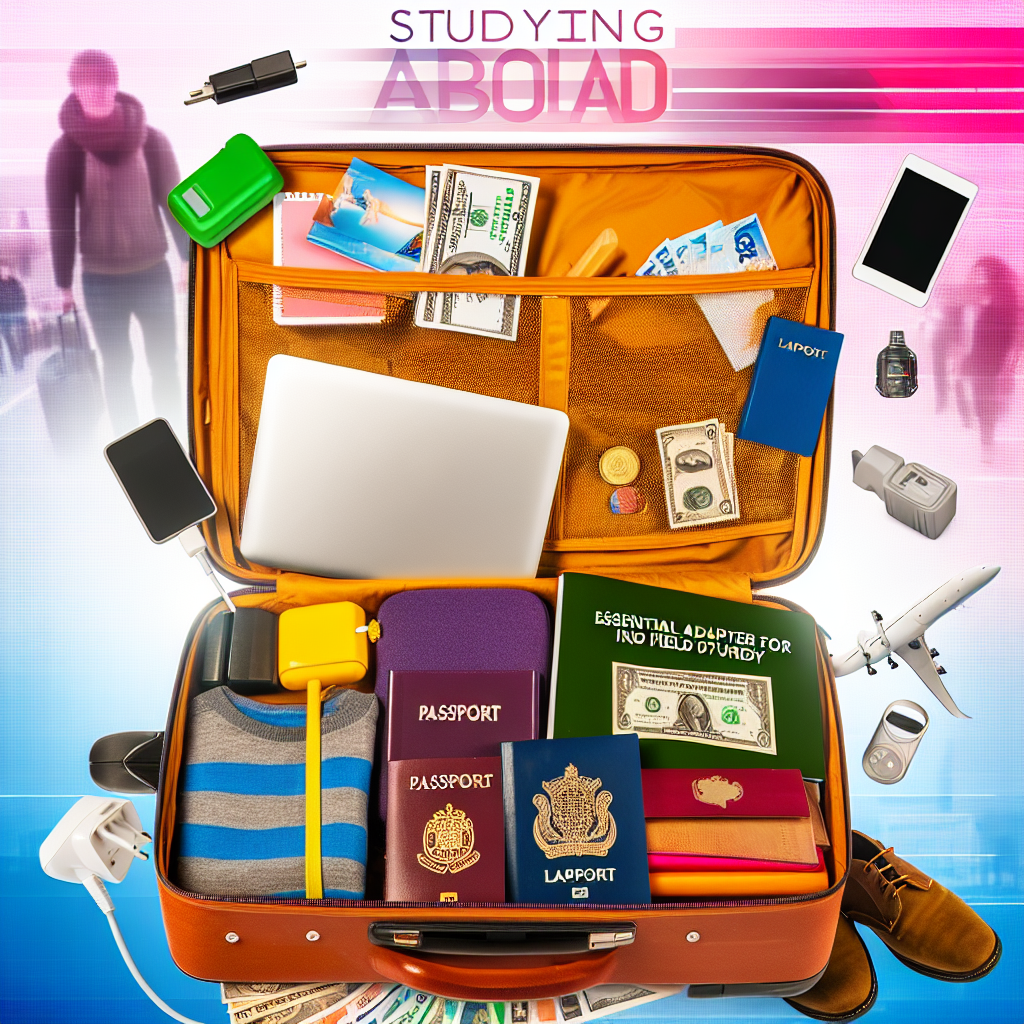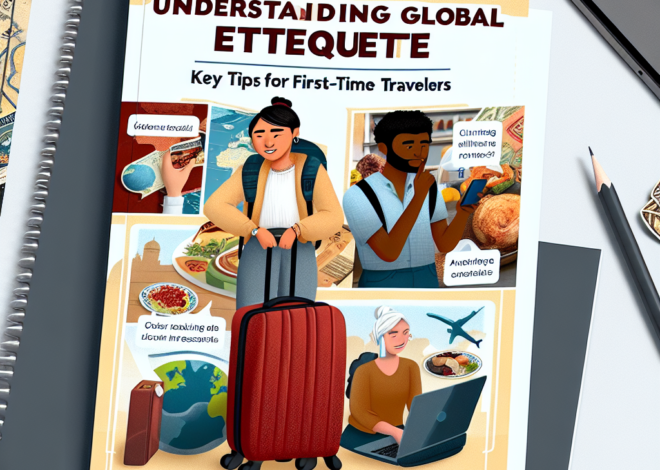
Essential items every student must pack when studying abroad
-
Table of Contents
“Pack Smart, Study Abroad: Essentials for Every Global Scholar”
Introduction
When studying abroad, packing efficiently is crucial as it can significantly influence your experience in a new country. Students must consider not only clothing and personal items but also essential documents, electronic devices, and specific items that can help them adapt to and navigate their new environment effectively. The following list highlights the indispensable items every student should include when preparing for an educational stint overseas, ensuring they are well-equipped for both academic and daily living needs.
Essential Documents and Financial Tools
When embarking on the exciting journey of studying abroad, students must ensure they are thoroughly prepared, particularly when it comes to packing essential documents and financial tools. These items are crucial as they not only facilitate a smooth entry into a new country but also serve as a safety net throughout the duration of their stay.
First and foremost, a valid passport is indispensable. It is the primary form of identification recognized internationally and is required for all travel across borders. Students should verify that their passport has at least six months of validity beyond their intended date of return. This is a common requirement for many countries which helps to avoid any issues with immigration authorities.
Equally important is the student visa. Securing the correct visa is essential as it grants the legal right to study and, in some cases, work in the host country. The process of obtaining a visa can be lengthy and complex, requiring various forms of documentation and sometimes an interview. Therefore, it is advisable to begin this process well in advance of the departure date.
Another critical document is the letter of acceptance from the educational institution abroad. This document proves that the student is expected at the institution and is often required at immigration checkpoints. Alongside this, carrying a copy of the course registration can assist in verifying the purpose of the visit if questioned by officials.
Health insurance documentation is also a must-have. Many countries require proof of adequate health insurance coverage for incoming international students. This ensures that students can access healthcare without incurring prohibitive costs. It is prudent to carry both physical and digital copies of this document, ensuring it is easily accessible when needed.
Transitioning to financial tools, a reliable way to manage finances is essential for any student studying abroad. An international debit or credit card is highly recommended as it simplifies transactions and reduces the need to carry large amounts of cash. Before departure, students should confirm with their bank that their cards are authorized for international use and inquire about potential fees for foreign transactions and withdrawals.
Moreover, setting up a local bank account can be beneficial for students staying abroad for a longer period. It often provides easier access to funds, lower transaction costs, and the possibility of receiving any local financial aid or work payments. Understanding the banking system in the host country and the requirements for opening an account is therefore crucial.
Lastly, it is wise to have access to emergency funds. Unforeseen circumstances such as lost luggage, medical emergencies, or unexpected trips can incur extra expenses. Having a contingency fund that is readily accessible can alleviate stress and provide financial security.
In conclusion, preparing the necessary documents and financial tools is a fundamental step in planning for study abroad. Ensuring that all paperwork is in order, understanding the financial landscape of the host country, and having a backup financial plan are all strategies that collectively secure a student’s wellbeing and success abroad. By meticulously organizing these essentials, students can focus more on the enriching experience of their academic and cultural pursuits overseas.
Health and Personal Care Items
When embarking on the exciting journey of studying abroad, students must consider not only their academic needs but also their health and personal care. Packing essential items in this category is crucial for maintaining well-being and comfort throughout their stay in a foreign country. This article outlines the indispensable health and personal care items every student should include in their luggage to ensure a safe and healthy experience abroad.
First and foremost, a well-stocked first aid kit is essential. This kit should include basic supplies such as bandages, antiseptic wipes, gauze, and tape, as well as any specific medications that the student regularly uses. It’s also wise to include pain relievers, fever reducers, and anti-inflammatory drugs. Students should remember to check the legality and availability of their medications in their destination country; some medications that are over-the-counter in one country may be restricted in others.
In addition to a first aid kit, students should pack enough prescription medications to last the duration of their stay, or at least until they can find a local healthcare provider. Medications should be kept in their original packaging to avoid any issues at customs and should be accompanied by a doctor’s note explaining their necessity. This preparation prevents any interruptions in necessary medical treatments and avoids the complications of trying to procure medications abroad, which might differ in formulation or may not be available.
Another critical aspect of health preparedness is vaccinations. Students should research the recommended vaccinations for their destination and ensure they are up to date on all shots. This might include vaccines for hepatitis, typhoid, or yellow fever, depending on the region. Preventative measures like these are vital in protecting students from local diseases and in some cases, are mandatory for entry into the country.
Personal hygiene is another area that cannot be overlooked. While most toiletries can be purchased abroad, it is beneficial to start the journey with a small supply of personal favorites, especially if they might be hard to find in the host country. This includes items like a toothbrush, toothpaste, deodorant, shampoo, and conditioner. For those with sensitive skin or specific skincare routines, it is important to bring enough of the products they are accustomed to using, as local products may have different formulations that could cause skin irritation.
Moreover, students should consider the climate of their destination and pack accordingly. For instance, a good quality sunscreen and lip balm with SPF are crucial for students going to sunny locales, while those heading to colder climates might want to include moisturizer to combat dry skin. Additionally, a reusable water bottle is a must-have to stay hydrated while exploring or attending classes, and it’s an environmentally friendly choice.
Lastly, mental health is just as important as physical health. Items that support mental well-being, such as a journal, stress-relief gadgets, or even a small collection of favorite photos or mementos from home, can help in adjusting to a new environment and dealing with homesickness.
In conclusion, while packing for an educational stint abroad, it is imperative that students give due consideration to their health and personal care needs. By ensuring they have a comprehensive first aid kit, necessary medications and vaccinations, suitable personal hygiene products, and items to support their mental health, students can safeguard their health, allowing them to focus on the enriching experience of studying in a foreign country.
Appropriate Clothing and Footwear
When preparing for an educational journey abroad, students must carefully consider their packing list to ensure they are well-equipped for their new environment. Among the most critical items to pack are appropriate clothing and footwear, which can greatly influence both comfort and cultural integration. Understanding the climate and cultural norms of the destination country is essential in making informed choices about what to wear.
Firstly, researching the weather patterns of the host country throughout the year is crucial. Students should be aware of the seasonal variations they might encounter during their stay. For instance, if studying in a country with a predominantly cold climate, such as Sweden or Canada, it is imperative to include warm layers, thermal wear, and a durable winter coat. Conversely, for warmer climates like Australia or Brazil, lighter clothing made from breathable fabrics will be more suitable. This not only ensures comfort but also helps in maintaining good health as extreme temperatures can impact one’s physical well-being.
Transitioning from climate considerations, it is equally important to think about the cultural context of clothing. Many countries have specific dress codes that are deeply rooted in their cultural norms and values. For example, countries in the Middle East or parts of Asia may require more conservative attire, particularly for women. This might include avoiding short skirts, shorts, and sleeveless tops. Packing items that can be layered and adjusted to different settings, such as scarves or shawls, can be particularly useful. These not only help in adhering to local norms but also offer versatile fashion options.
Moreover, footwear is another pivotal aspect of the packing process. The choice of shoes should align with both the activities planned and the general terrain of the country. A student studying in a city with a lot of walking, like Paris or Tokyo, should consider comfortable, durable walking shoes. On the other hand, if the study involves fieldwork or outdoor activities, as might be the case in rural or mountainous regions, sturdy boots may be necessary. Additionally, for countries with rainy seasons, waterproof shoes or boots are advisable to prevent discomfort and health issues such as colds and fungal infections.
It is also wise to consider the availability and cost of clothing and footwear in the destination country. In some places, these items might be significantly more expensive or not readily available in suitable sizes or styles. This is particularly relevant for students who are exceptionally tall, petite, or plus-sized. Packing extra pairs of essential items, like shoes and basic clothing, can save both time and money.
Lastly, while practicality is key, students should not forget to include items that make them feel comfortable and at home. A favorite sweater, a pair of comfortable jeans, or even culturally appropriate yet stylish attire can make the transition to a new environment smoother and more enjoyable. These familiar items can provide a sense of security and comfort, which is invaluable in a new and potentially challenging environment.
In conclusion, packing for studying abroad involves a careful balance of practicality, cultural sensitivity, and personal comfort. By thoroughly researching and thoughtfully selecting their clothing and footwear, students can ensure that their focus remains on their studies and experiences, rather than discomfort or cultural faux pas. This preparation will not only ease the physical transition but also aid in the cultural assimilation process, making the study abroad experience both enriching and memorable.
Technology and Communication Devices
When embarking on the exciting journey of studying abroad, students must carefully consider the technology and communication devices they pack. These items are not just tools for academic success but also lifelines to family and friends back home, making them indispensable for both work and personal life.
First and foremost, a reliable laptop or tablet is crucial. This device will serve as the central hub for a student’s academic activities, including research, essay writing, and attending online lectures. It is advisable to choose a model that balances performance with portability, as it will need to fit comfortably in a backpack and endure daily commutes to campus. Additionally, ensuring that the device has a good battery life can be a lifesaver during long days at university where power outlets may be scarce.
Alongside a primary device, investing in a high-quality smartphone is equally important. A smartphone not only keeps students connected with their peers and professors through calls and messages but also helps manage daily tasks through various apps. Features such as a good camera can also enhance the experience abroad by allowing students to capture and share their experiences more vividly. Furthermore, it is essential to check that the smartphone is unlocked and compatible with mobile networks in the destination country. This compatibility will enable students to use local SIM cards, which are often more cost-effective than international plans.
Another vital piece of technology is a set of noise-cancelling headphones. These can be particularly useful in noisy environments like shared accommodations or public transport, providing a way to focus on studies or relax with music without distraction. Noise-cancelling headphones can also be a boon during online classes or exams, helping to create a more controlled and quiet environment.
Portable chargers and power banks also deserve a spot in every student’s luggage. Given the extensive use of electronic devices in daily student life, having a portable power source can prevent situations where critical devices run out of battery at inopportune times. It is wise to choose a power bank with multiple outputs and high capacity to ensure that all devices can be charged simultaneously if necessary.
Lastly, adaptability to different technological standards in a new country is crucial. Students should include a universal travel adapter in their packing list. This simple tool ensures that all electronic devices can be charged, no matter the differences in voltage or socket type found in the destination country. Additionally, carrying a few extra cables and perhaps a multi-port USB charger can help keep all devices powered and ready to use.
In conclusion, when packing for an educational stint abroad, it is essential to prioritize the inclusion of technology and communication devices that not only aid in academic pursuits but also help maintain important connections back home. By selecting these items thoughtfully, students can ensure a smoother transition to their new environment and a more productive and enjoyable stay. Thus, a well-equipped tech arsenal is not just about convenience but a critical component of modern academic success and personal well-being while studying abroad.



